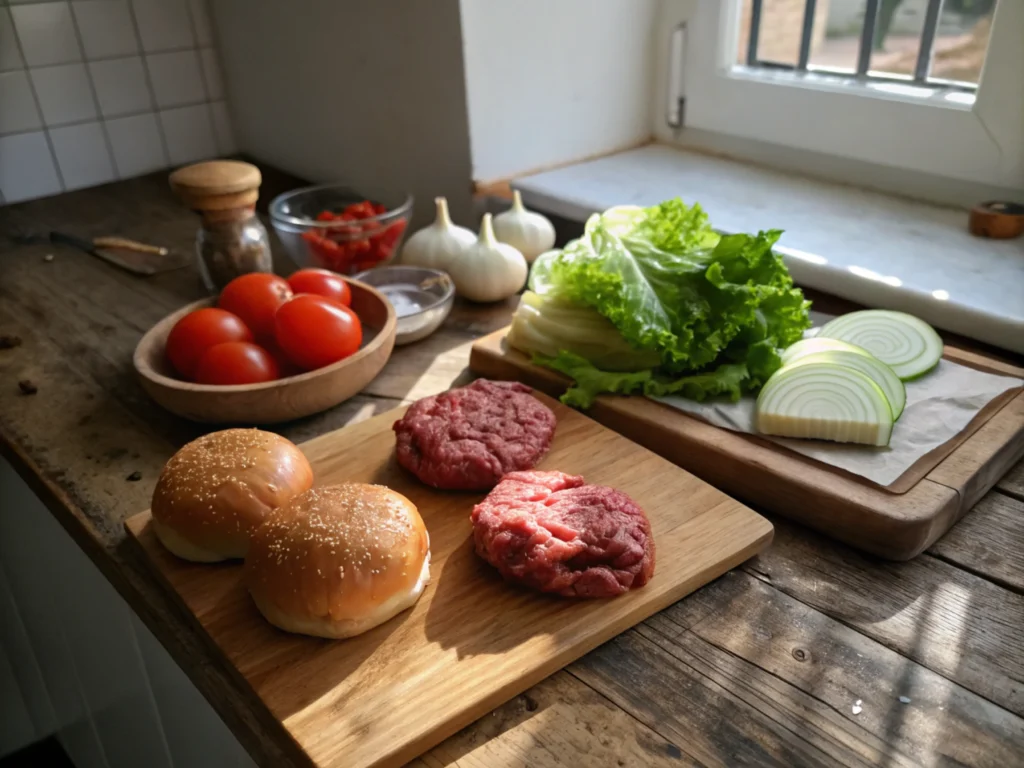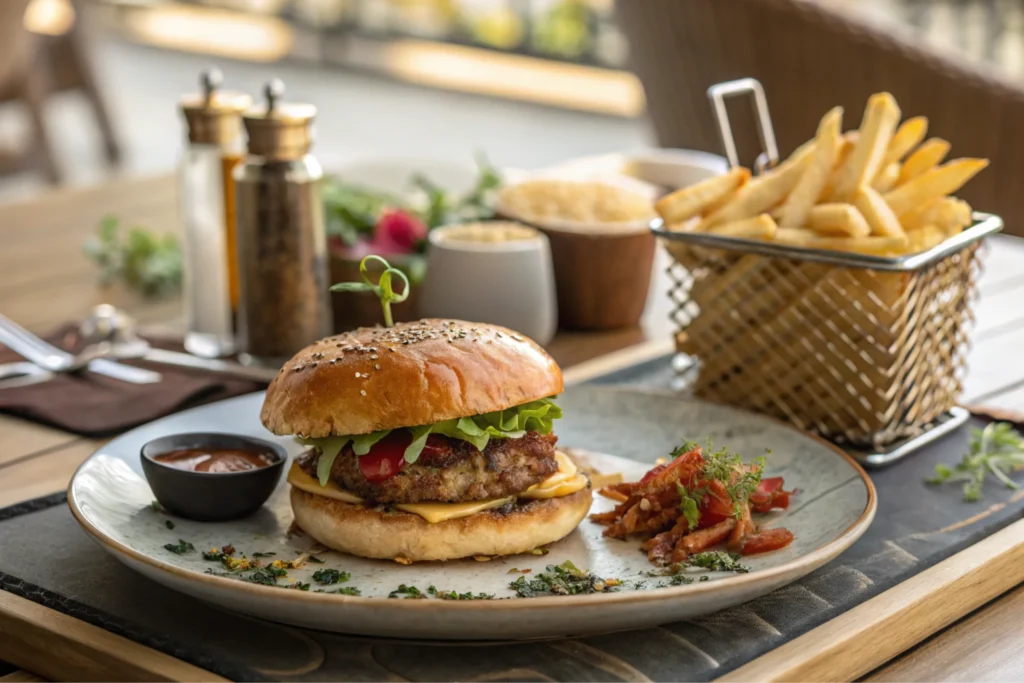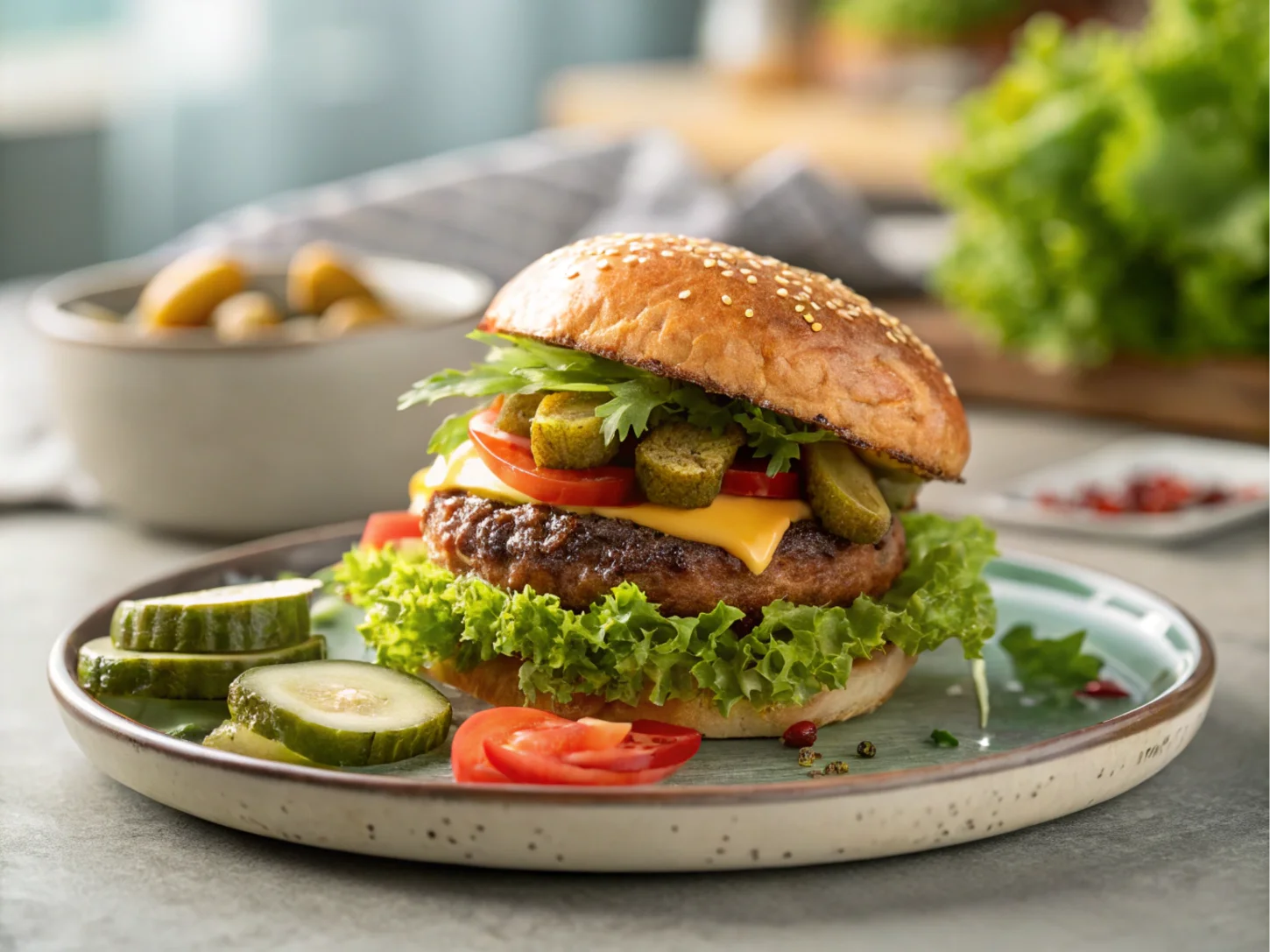What is different about halal burger? Burgers have become a universal food favorite, loved for their endless variations, flavors, and convenience. However, if you’ve encountered the term “halal burger,” you may wonder what sets it apart. To clarify, beyond being a culinary delight, halal burgers reflect a specific set of dietary laws, preparation standards, and cultural values that make them unique. Indeed, understanding these differences will not only deepen your appreciation for halal burgers but also highlight why they are gaining popularity among diverse communities worldwide.
In this article, we will explore what makes a burger halal, the differences compared to regular burgers, and how you can prepare your own delicious halal burger at home. Additionally, we’ll touch on the ethical, health, and taste benefits of choosing halal options. Whether you are a food enthusiast or someone exploring halal cuisine, this guide will answer all your questions. In essence, it aims to provide a comprehensive look into what makes halal burgers an appealing choice for many people today.
Table of contents
What Makes a Burger Halal?
For a burger to be considered halal, it must adhere to strict dietary guidelines based on Islamic laws. These guidelines ensure the food is clean, permissible, and ethically sourced.
Halal Meat Preparation – The Zabiha Method
The most significant aspect of a halal burger is the meat. Halal meat is prepared using a specific method called Zabiha, which ensures the process is humane, ethical, and clean. Here’s how it works:
- Invocation of God’s Name – Before slaughter, the butcher recites a prayer (Bismillah), asking for the meat to be blessed. This step is critical to ensure the meat is permissible under Islamic law.
- Swift, Humane Slaughter – A single, swift cut to the throat severs the jugular vein, carotid artery, and windpipe. This ensures a quick, humane death and minimal pain for the animal.
- Blood Removal – The blood is drained completely from the body, as consuming blood is forbidden in Islam. This process also reduces the risk of contamination.
This careful slaughtering method not only aligns with religious requirements but also enhances the meat’s overall quality, making it cleaner and fresher.
For a deeper dive into halal meat standards, check out this detailed halal burger preparation guide.
Ingredient Standards
In addition to meat, all ingredients in a halal burger must comply with halal standards. This means:
- No pork or pork derivatives (e.g., gelatin).
- No alcohol-based additives or cooking agents.
- Ingredients must be sourced and prepared in ways that avoid cross-contamination.
Kitchens serving halal food often dedicate separate utensils and cooking spaces to maintain these standards, ensuring the integrity of halal products.
Key Differences Between Halal Burgers and Regular Burgers
So, what makes a halal burger different from a regular one? The distinction goes beyond the religious aspect and extends to sourcing, preparation, and taste.
Sourcing and Ingredients
- Halal Burgers: Meat is sourced exclusively from halal-certified suppliers that follow strict Zabiha methods. Additionally, all accompanying ingredients (spices, sauces, and bread) are vetted to ensure compliance.
- Regular Burgers: Meat may be sourced from large-scale industrial suppliers, with no guarantee of ethical slaughter. Ingredients may contain non-halal additives or cross-contaminants like pork fat.
Cleanliness and Preparation Practices
Halal food preparation adheres to rigorous cleanliness and safety standards. Kitchens that serve halal burgers maintain:
- Dedicated cooking spaces for halal food.
- Separate utensils and equipment to avoid mixing with non-halal products.
- Strict hygiene practices to ensure food purity.
In contrast, conventional kitchens often lack these precautions, increasing the risk of cross-contamination.

Taste and Quality Differences
The preparation process for halal meat contributes significantly to its taste and texture. Many people describe halal burgers as:
- Fresher and Juicier – Removing all blood during Zabiha prevents spoilage and enhances the meat’s natural flavor.
- More Tender – The humane slaughtering process reduces stress on the animal, which can otherwise toughen the meat.
- Cleaner Taste – The absence of blood and contaminants results in a purer, cleaner flavor profile.
So, does halal meat taste different? The answer is yes – but in a subtle, superior way. Halal meat delivers a quality that is difficult to match in mass-produced, non-halal alternatives.
Why Choose Halal Burgers?
Halal burgers are not just for those who follow Islamic dietary laws. In fact, they are increasingly popular among food lovers and ethical consumers for a variety of reasons. For one thing, the meticulous preparation and ethical sourcing of halal meat appeal to those seeking quality and integrity in their food. Moreover, halal burgers offer a cleaner, blood-free option, which undoubtedly enhances both taste and freshness. As a result, they have become a preferred choice for individuals who value both flavor and ethics in their dining experience. Overall, halal burgers cater to a broad audience, combining culinary delight with mindful eating practices.
Ethical Meat Production
The Zabiha method explicitly emphasizes compassion and respect for animals, ensuring humane slaughter. As a result, it resonates with consumers who prioritize animal welfare. Moreover, in an era where many criticize factory farming practices, halal meat undoubtedly provides a transparent and ethical alternative. Consequently, more people recognize its value as a responsible choice.
For burger enthusiasts interested in ethical and flavorful alternatives, consider reading about brisket burgers and their quality benefits.
Health Benefits of Halal Meat
Halal burgers are not only delicious but also healthier for you:
- Blood-Free Meat: Blood can harbor bacteria, toxins, and impurities. The Zabiha process eliminates this, resulting in cleaner, safer meat.
- Lower Risk of Contamination: Halal meat is less likely to be contaminated with harmful chemicals or cross-contaminants.
- Nutrient-Rich: The humane slaughtering method helps retain the meat’s natural nutrients and proteins, making it a better source of high-quality protein.
For health-conscious individuals and families, halal burgers provide a nutritious, high-quality meal option without compromising on taste.
How to Make a Delicious Halal Burger at Home
Creating your own halal burger at home is an easy way to enjoy this flavorful and ethical dish. By using fresh, halal-certified ingredients, you can replicate restaurant-quality burgers in your own kitchen.

Ingredients You’ll Need
To prepare the perfect halal burger, gather these fresh, simple ingredients:
- Halal-Certified Ground Beef – Use 80/20 lean-to-fat ratio for juicy patties.
- Freshly baked burger buns.
- Sliced tomatoes, lettuce, onions, and pickles.
- Halal cheddar cheese slices.
- Condiments: mayonnaise, ketchup, mustard (check for halal certification).
- Optional spices: salt, pepper, garlic powder, and paprika.
Step-by-Step Instructions
- Mix and Shape the Patties: Combine ground halal beef with salt, pepper, and your favorite seasonings. Gently shape into evenly sized patties, about ½ inch thick.
- Heat the Grill or Skillet: Preheat a grill or skillet to medium-high heat. Lightly oil the surface to prevent sticking.
- Cook the Patties: Grill the patties for 3–4 minutes per side, or until they reach your desired doneness. Avoid pressing down on the patties to retain their juices.
- Toast the Buns: Lightly toast the burger buns on the grill or a skillet for added flavor and texture.
- Assemble Your Burger: Place the cooked patty on the bottom bun, followed by a slice of halal cheese, fresh vegetables, and your choice of condiments. Finish with the top bun.
- Serve Immediately: Pair your halal burger with crispy fries, a fresh salad, or grilled vegetables for a complete meal.
By following these steps, you can enjoy a homemade halal burger that rivals any restaurant version. Not only will it satisfy your cravings, but you’ll also appreciate the quality and freshness that halal-certified ingredients provide.
Popular Halal Burger Variations Worldwide
Halal burgers are a versatile and delicious option enjoyed across different cultures. Chefs worldwide infuse regional flavors and unique ingredients to create halal burgers that reflect local tastes and traditions. From the bustling streets of the Middle East to Western gourmet kitchens, the creativity behind halal burgers knows no bounds.
Middle Eastern-Style Halal Burgers
In Middle Eastern cuisine, halal burgers often feature lamb or spiced beef. Cooks season the meat with cumin, coriander, and paprika to create a bold and aromatic flavor profile. They top these burgers with creamy tahini sauce, pickles, and fresh vegetables to complement the spiced meat.
For an elevated Middle Eastern dish, check out this recipe for turkey ribs with easy preparation and health benefits.
American-Style Halal Cheeseburgers
In the United States, halal burgers bring a halal twist to the iconic cheeseburger. Juicy beef patties are paired with halal-certified cheddar cheese, fresh lettuce, tomatoes, and condiments like ketchup or halal mayonnaise. This classic style provides the comfort of traditional fast food while meeting halal dietary standards.

Indian-Inspired Halal Burger
Indian-style halal burgers undoubtedly embrace bold spices and flavors, often using minced chicken or lamb infused with garam masala, turmeric, and chili. Moreover, these burgers may be served with a cooling yogurt-based sauce or, alternatively, topped with chutney and fresh cilantro for added flavor. In particular, the combination of spices and toppings significantly enhances the taste, creating a unique and vibrant culinary experience. Altogether, Indian-style halal burgers offer a delicious twist that appeals to lovers of both traditional and modern flavors.
Asian Fusion Halal Burgers
In Southeast Asia, halal burgers take on unique flavor fusions. For instance, a teriyaki-glazed beef patty paired with caramelized onions creates a sweet-savory combination. Popular additions include crispy fried egg or spicy sambal sauce for an extra kick.
By exploring these diverse halal burger variations, you’ll find inspiration to create new recipes that cater to your taste preferences and cultural interests.
Pro Tips and Variations for the Perfect Halal Burger
To take your halal burger experience to the next level, consider these expert tips and creative variations.
Choosing the Right Meat
For a juicy and flavorful patty, use ground beef with an 80/20 lean-to-fat ratio. If you prefer alternatives, choose halal chicken, turkey, or lamb as excellent substitutes. Source the meat explicitly from halal-certified suppliers to ensure authenticity. This approach aligns the preparation with halal dietary laws while maintaining quality and flavor. Using halal-certified options enhances both the ethical and culinary experience.
Flavor Boosters
- Marinate the Patties: Add Worcestershire sauce, garlic, and onion powder for extra flavor.
- Experiment with Spices: Cumin, smoked paprika, and chili flakes can elevate the taste.
- Stuffed Patties: Place a slice of halal cheese inside the patty for a gooey surprise.
Unique Toppings
Think beyond the usual lettuce and tomato. Here are some creative toppings to try:
- Caramelized onions and mushrooms.
- Avocado slices or guacamole.
- Spicy jalapeños for heat.
- Fried egg for a rich, hearty touch.

Serving Suggestions
Pair your halal burger with sides that complement its flavors. Some excellent options include:
- Crispy sweet potato fries or onion rings.
- Fresh garden salad with tangy vinaigrette.
- Coleslaw for a refreshing contrast.
For a full halal meal experience, serve your burger with a creamy milkshake or sparkling lemonade.
Frequently Asked Questions (FAQs)
What is the difference between halal burgers and regular burgers?
Halal burgers differ in how the meat is sourced and prepared. The Zabiha process ensures humane slaughter, blood removal, and adherence to halal dietary laws. In contrast, regular burgers may not follow ethical or religious guidelines.
What makes a hamburger halal?
A halal hamburger must use meat from animals slaughtered according to Islamic principles. Additionally, all other ingredients, including seasonings, sauces, and buns, must be free from non-halal substances like pork derivatives or alcohol.
How is halal meat different from regular meat?
Halal meat is prepared using the Zabiha method, which involves blessing the animal, humane slaughter, and draining all blood. This process ensures cleaner, fresher meat that is free from impurities and toxins often found in blood.
How does halal meat taste different?
Halal meat is often described as more tender, clean, and flavorful. The absence of blood eliminates any metallic aftertaste and reduces the risk of spoilage, resulting in superior quality and taste.
Can non-Muslims eat halal burgers?
Yes, halal burgers are suitable for everyone. Many people choose halal meat for its ethical and hygienic preparation, regardless of their religious beliefs.
Where can you buy halal burgers?
Halal burgers can be found in halal-certified restaurants, specialty grocery stores, and online retailers. Many mainstream fast-food chains now offer halal options to cater to diverse dietary needs.

Conclusion
Understanding what is different about a halal burger explicitly sheds light on the careful preparation, ethical sourcing, and superior taste that make these burgers stand out. In particular, from the humane Zabiha process to the clean, blood-free meat, halal burgers evidently offer a high-quality alternative that appeals to both religious and ethical consumers.
Whether you’re making halal burgers at home, exploring global variations, or enjoying them at a restaurant, the flavors and values behind this food are undeniably remarkable. For instance, with options ranging from classic American cheeseburgers to bold Indian-inspired recipes, halal burgers undoubtedly offer something for everyone to savor. In summary, they combine taste, ethics, and cultural diversity into one satisfying bite.
For more delicious recipe ideas, check out this guide on what does raclette consist of?.
By choosing halal, you are not only indulging in delicious food but also, at the same time, supporting practices that prioritize animal welfare, cleanliness, and quality. Moreover, it is important to realize that halal standards are designed to ensure ethical and hygienic food preparation. For that reason, next time you crave a burger, consider trying a halal option – your taste buds and conscience will thank you! After all, it is a choice that combines flavor with ethical responsibility.

